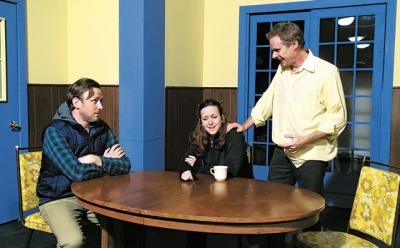Probing ‘Dead Accounts’ in Quogue

At a time when Iowa is dominating the headlines because of its imminent caucuses to help select the next president, the sobering differences between the mores and beliefs of middle America and those of the coastal elites could not be clearer.
It is no surprise that our country is divided geographically, but in the past decade, as the gulf between the have-nots and the have-everythings at the very top of the wealth pyramid has expanded, these divisions have become more complex.
The Hampton Theatre Company’s impeccably timed production of “Dead Accounts,” beginning next Thursday at the Quogue Community Hall, could serve as a primer for those flummoxed by the cult of Donald Trump and/or Bernie Sanders. Yet, it will also tap into that complexity in ways that audiences may find challenging.
Theresa Rebeck’s dark comedy focuses on Jack Leonard, a Cincinnati native who briefly dipped his feet in the world of New York finance. He suddenly returns home sans wife, but with millions in new assets. His sister, Lorna, has stayed home in Ohio to help their mother take care of their father, who is ill.
Andrew Botsford, the director of the play, sees “Dead Accounts” as the issues of American political and economic divides writ large, but also as the interpersonal workings of a family that, as Ms. Rebeck says in a forward she wrote for the play, “doesn’t know how to talk to each other anymore.”
The play was not warmly received by critics when it was performed in New York in 2012, with Katie Holmes and Jack Butz in starring roles. Mr. Botsford said he didn’t read the original reviews until rehearsals started so they wouldn’t shape his interpretation, but he thinks the critics got it wrong. “It’s hard to say what this play is. They seemed to want it to fit into either a comedy or tragedy category, but it seems to be both.”
Still, The Wall Street Journal’s critic was able to determine that the play was “a dead-serious comedy about what happens to people who, like Jack and Lorna, wake up one morning and realize that their lives haven’t lived up to their dreams.”
After he participated in a summer workshop with Halley Feiffer at Stony Brook Southampton, where the actress and playwright asked participants to find either the tragic in the comic or the comic in the tragic, Mr. Botsford said this play appealed to him. “Shakespeare’s tragedies have comic relief at times, but life is both at all times. You tend to laugh, because things can get so dark.”
He said that Ms. Rebeck “writes characters who are not that likable but are very human.” When he asked John Carlin to read for the role of Jack, Mr. Carlin replied that he would need to find a way to make the character likable. Mr. Botsford did not see it that way, but he said Mr. Carlin, who reached out to Ms. Rebeck, “responded to the character in his own way,” and he found his interpretation very effective. “At the end of the play it’s up to the audience and actors to decide where do we leave these characters in their journey.”
God and money (or mammon from the Bible) become huge themes in the play. How the characters reconcile their relationships to both has a lot to do with the play’s drama and humor. “The spiritual lesson from the Bible is that you can’t serve both God and mammon, you have to take your pick. But in reality, you need some of each.”
In addition to Mr. Carlin, Peter Connolly, Rebecca Edana, Diana Marbury, and Mary McGloin star in the play. The sets were designed by Peter-Tolin Baker, with lighting design by Sebastian Paczynski and costumes by Teresa Lebrun. Ms. McGloin, a newcomer to the company, plays Lorna, portrayed in New York by Ms. Holmes. Their mother is played by Ms. Marbury, who is the company’s artistic director.
Ms. Rebeck has written many well-received plays including “Omnium Gatherum,” a finalist for the Pulitzer Prize in drama that she co-wrote with Alexandra Gertstein-Vassilaros. She is also known for creating the television series “Smash,” about the making of a Broadway musical. She was born in Ohio and went to high school in Cincinnati.
The play is not a comic romp, nor is it “A Long Day’s Journey Into Night,” Mr. Botsford said. Yet, “there are soliloquies that are Shakespearean” in their tone and content. “I think the reason why it was savaged was that it wasn’t done right. I believe we are doing it beautifully, and I hope audiences agree.”
“Dead Accounts” runs at the Quogue Community Hall from next Thursday through Jan. 31 with shows on Thursdays and Fridays at 7, Saturdays at 8, and Sundays at 2:30. The performance on Jan. 21 will be followed by a talkback with members of the cast and the director.
Tickets can be reserved through the company’s website or through Ovation Tix.
